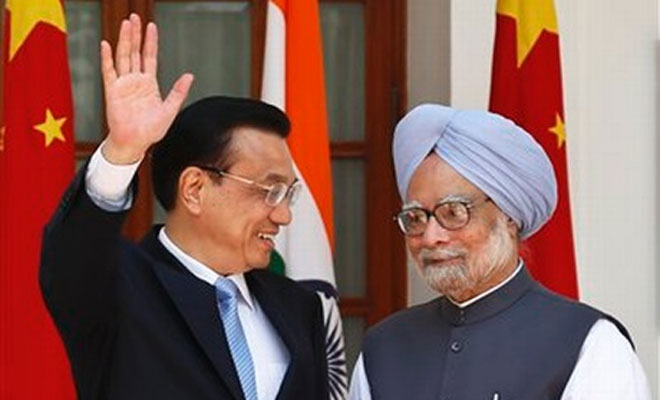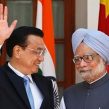
Chinese Trade-Charm Push Reaches UK and India
Publication: China Brief Volume: 13 Issue: 21
By:

China’s trade-backed charm offensive has reached India and the United Kingdom, as Chinese leaders signed a raft of trade deals with the United Kingdom and a border pact with India that may reduce incidents along the Line of Actual Control (LAC). These follow high-profile trade diplomacy tours through Central and Southeast Asia, during which Chinese leaders made small proposals for lowering tension on territorial disputes. Premier Li Keqiang suggested cooperation Vietnam in the disputed waters of the South China Sea. These deals appear to belong to a broad, if shallow effort to shelve political questions in favor of trade (For more on the SCO, see “China and the SCO: Dead Wood but a Good Platform” in China Brief, Volume 13, Issue 20; for Southeast Asia, see “Beijing Unveils New Strategy for ASEAN-China Relations” in this issue).
China does not appear willing to make concessions on political issues—but it is trying to change the subject in bilateral relationships that have grown increasingly confrontational in recent years. All these deals appear to fit with Chinese President Xi Jinping’s concept of “a new type of international relations”—while China has not inserted the term into speeches or official statements at recent meetings, it is increasingly clear that China is seeking to improve the tone of its relationships with foreign countries, avoiding confrontation while quietly winning foreign recognition of the legitimacy of the regime (see China Brief, Volume 13, Issue 15).
This charm campaign may be aimed at, as a quasi-authoritative editorial in the People’s Daily proposed in May, “Building a Favorable External Environment in Order to Achieve the China Dream” (People’s Daily, May 31—the editorial was signed “Guo Jiping,” described by the newspaper as an internationally-focused equivalent to Zhongsheng). However, China still appears to have an aggressive posture towards its most contentious territorial disputes, with Japan and the Philippines. Most recently, China canceled an invitation to Philippine President Benigno Aquino to a trade fair, seemingly in retribution for his pursuit of international arbitration in the South China Sea (South China Morning Post, August 2).
Britain Settles Dalai Lama Row
Two prominent members of the UK’s governing Conservative Party, Chancellor of the Exchequer George Osborne and London mayor Boris Johnson spent a week in Beijing, signing a package of deals that will considerably open the British economy to China—and give London a stake in China’s gradual liberalization of its currency. Agreements reached during the visit include:
- Allowing Chinese state companies to invest in British nuclear power plants, with two state-owned enterprises (SOE) taking an estimated 30% share of a new $22 billion plant (BBC, October 17).
- Creating a streamlined visa application process for Chinese nationals, including a pilot program to accept the European Union’s unified Schengen visa form, a 24-hour rush service and expanding a “VIP mobile visa service” that currently allows Beijing and Shanghai residents to pay for consular officials to come to their homes or offices (gov.uk, October 14).
- Inking a currency deal that will allow limited trading of the largely closed renminbi (RMB) in London and permit up to $13 billion in direct asset purchases from London to China (Bloomberg, October 15).
The nuclear investment deal is a win for UK Prime Minister David Cameron on a major policy priority, a push to raise capital for infrastructure overseas and especially in China that dates back to 2011 (UK National Infrastructure Plan 2011). The currency trading deal, while small, will make London the first Western financial center to offer RMB trading and may position the City to develop this market if currency reforms continued, as suggested by the Shanghai Pilot Free Trade Zone (South China Morning Post, September 5). Speaking in Beijing, Osborne promoted the UK as a destination for Chinese investment, contrasting its policies to U.S. limits on Chinese investment. He highlighted the Chinese telecoms company Huawei, largely frozen out of the United States over national security concerns: “There are some Western governments that have blocked Huawei from making investments. Not Britain. Quite the opposite. That is why I was pleased to welcome Huawei’s opening of a flagship office in our country in June, and the £1.3 billion [$2.1 bn] of investment that came with it” (The Telegraph, October 16). Huawei also announced plans this week to expand its UK operations with a $202 million research and development center.
These deals come in the wake of a prolonged period of frosty ties, as China sought to punish Cameron for a May 2012 meeting with the Dalai Lama, canceling invitations to visit the country and suspending talks on investment deals. Such tactics have proved especially effective with European countries since the 2008 financial crisis—European austerity policies have made foreign direct investment extremely attractive to governments unwilling to spend their way out of recessions (for more on China’s investment diplomacy in the EU, see European Council on Foreign Relations policy brief “The Scramble for Europe”).
Europe’s hunger for foreign investment has allowed China to broker a number of one-way deals, while European access to Chinese markets remains fairly limited. The EU is currently negotiating an investment treaty with China. China’s willingness to scale back or temporarily break off diplomatic and trade ties over Tibet has been fairly effective in shaping the behavior of other states.
Examining previous disputes, in which China broke off regular relations with France and Germany over meetings with the Dalai Lama, it is possible to see a pattern—and to gauge the price China demands to settle these disputes. China successfully pushed France and Germany to disavow support for Tibetan independence in order to restore ties following similar incidents, although in different fashions. In 2009, China extracted a joint communiqué from France recognizing Tibet as an “integral part of China” using much of China’s preferred language: “with due regard for the principle of non-interference, France objects to all support for Tibet’s independence in any form whatsoever” (French Ministry of European and Foreign Affairs, April 1, 2009).
In a similar case following a meeting between German Chancellor Angela Merkel and the Tibetan religious leader, in 2007–2008, the dispute was resolved by an exchange of secret letters between the German and Chinese foreign ministries, followed by a minister-to-minister phone call in which Germany also promised to respect Chinese control of Tibet, as well as a speech in Beijing in which Merkel promised not to support to “pro-independence separatist forces in Taiwan” (Speigel Online, January 21, 2008; China Daily, August 29, 2007). The German foreign ministry told Der Speigel that its letter did not recognize China’s favored principle of non-interference. The United States has also been influenced by this pressure, asking the Dalai Lama to change his travel plans in order to avoid Washington before important U.S.–China meetings (see Jeffery Bader, Obama and China’s Rise: Brookings Institution Press, 2013).
Publicly, Cameron appears to have ended his dispute with China more cheaply than Germany, and certainly more cheaply than France: In public, he refused to apologize for the meeting and told British media that Beijing “can’t tell me who I can meet,” but allowed Osborne to say that “the Prime Minister is not planning to meet the Dalai Lama” and reportedly forbade members of his government from meeting him (Daily Mail, May 7; The Guardian, October 14). On an official level, the British government made what seems to be the standard disavowal of Tibetan independence in a June phone call between the two sides’ foreign ministers (China Daily, June 25). The last gesture has been cited by the Chinese press as the end of the dispute, with China’s perceived gains summed up in a widely-reprinted headline: “The UK is not for ‘Tibetan Independence.’” However, the German exchange of letters was also publicly described as a phone call, suggesting that a more formal promise may have been made behind the scenes (Chinese Ministry of Foreign Affairs (MoFA) press release, April 15, 2008).
An October 17 commentary by the semi-authoritative Zhongsheng column declared China’s satisfaction with the British response. It commented that Cameron had recognized his mistake, and declared this a prerequisite for restored ties, argued that this proved that a forceful posture had made China the “driver” of the relationship (People’s Daily). This has given Cameron’s critics at home an opportunity to criticize him as soft on China—UK media have described Osborne as a “Bambi” being manipulated by Beijing (The Guardian, October 19). In comparison with its European peers, however, it seems that the UK has paid no more than the going rate to settle the issue.
India-China Border Pact
Indian Prime Minster Manmohan Singh signed a Border Defense Cooperation Agreement (BDCA) during a late October trip to Beijing (The Hindu, October 23). The agreement seeks to avoid confrontations between Chinese and Indian border patrols, with the two sides agreeing to notify each other in advance of patrols and not to “tail” patrols by the other. Furthermore, it includes a series of confidence-building measures such as the establishment of a military-to-military hotline and regular meetings along the border.
Pushed by China, the agreement appears to be a step toward Premier Li Keqiang’s promise to “find a fair, reasonable, mutually acceptable solution” to the border question, made in a May speech in New Delhi during Li’s first trip abroad as Premier (MoFA website, May 22). The speech came only weeks after an incident in which India accused China of a series of incursions into its territory. Since then, New Delhi has experienced a spate of relative quiet, on the border dispute, as well as over India-Vietnam energy cooperation in the disputed area of the South China Sea, another source of tension (see “India in the South China Sea: Commercial Motives, Strategic Implications,” in China Brief, Volume 13, Issue 20).
Li’s May visit, while it yielded little concrete progress, was an early example of the relentlessly positive tone in which China has recently sought to portray its external relations. It was described by a foreign ministry press release as a “milestone” visit, and the joint statement issued during the visit raised the theme of shared destiny that China has used more recently with the Shanghai Cooperation Organization and ASEAN (the Association of Southeast Asian Nations):
The same document also recognized China’s demand not to be criticized on human rights issues, mentioning “the right of each country to choose its own path of social, economic and political development.”
In light of both the border agreement and China’s charm offensive with its other neighbors, it may be worth reevaluating Li’s May trip as the start of a campaign to mend the external environment for China’s rise—at least, as far trade diplomacy will take it.





